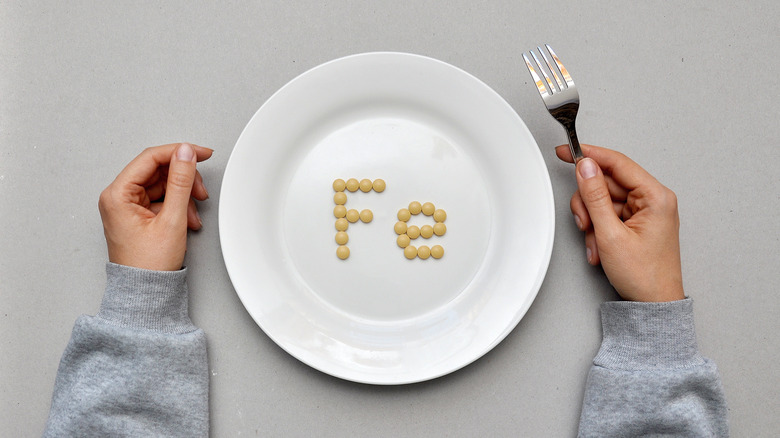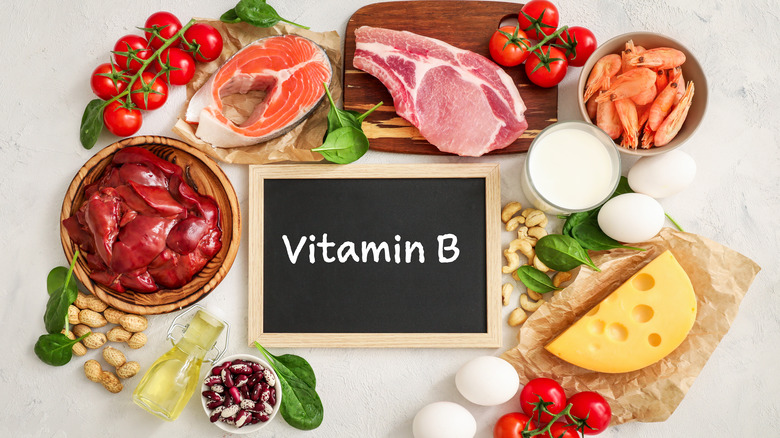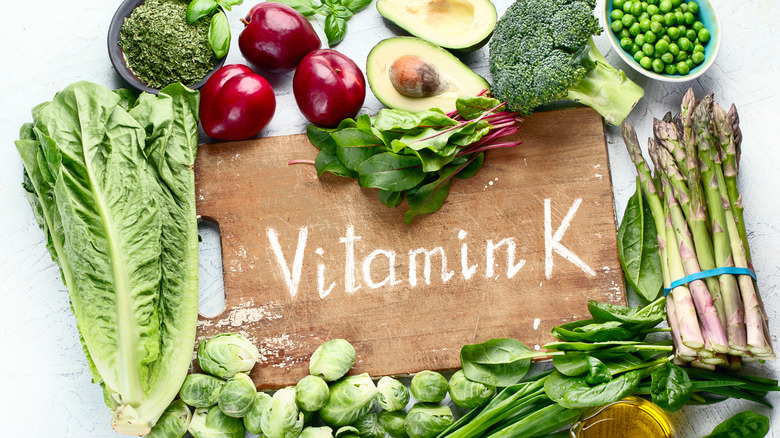If You Have IBD, You're Probably Deficient In These Nutrients
Inflammatory bowel disease is a medical term used to describe ulcerative colitis and Crohn's disease. The Crohn's and Colitis Foundation of America states that about 1.6 million Americans have inflammatory bowel disease, and there are approximately 70,000 people diagnosed every year. These health conditions cause chronic inflammation in the gastrointestinal tract, damaging the gastrointestinal (GI) tract.
These diseases affect nutrient absorption and digestion. Symptoms are stomach pain, diarrhea, exhaustion, unintended weight loss, and rectal bleeding. Crohn's disease can affect any part of the GI tract from the mouth to the anus, while ulcerative colitis only affects the large intestine and rectum. Triggers cause the immune system to overreact, causing inflammation in the GI tract. Inflammatory bowel diseases can impact daily life and cause severe health problems.
According to Dr. Eric Berg, the inflammation in your gut diminishes your nutrition absorption. If you have one of these inflammatory bowel diseases, you are likely nutrient deficient in one or more areas. There are four common nutrient deficiencies linked to inflammatory bowel disease.
Iron
Irritable bowel disease can cause low iron levels because the inflammation decreases the amount of iron you're able to absorb. If your iron levels get too low, you can develop iron deficiency anemia, leaving you feeling weak and tired, experiencing hair loss and brittle nails, and even craving ice (via the American Society of Hematology).
Dr. Eric Berg notes 80% of people with irritable bowel syndrome are iron deficient. The best sources of iron are beef, liver, and spirulina. Dr. Berg recommends getting iron from your foods, not supplements, because you can get too much iron, causing other health problems.
According to the American Society of Hematology, other sources of iron are green, leafy vegetables; chicken; turkey; fish; legumes; and iron-enriched foods like cereal, pasta, and rice. Your doctor can test your blood for your iron levels to determine if you're low on iron. Your doctor might prescribe an iron supplement, depending on your health needs. If you have an iron deficiency, you'll need two to five milligrams of iron for every kilogram of body weight.
Vitamin D
According to Dr. Eric Berg, 70% of people with inflammatory bowel disease have vitamin D deficiency because inflammation doesn't allow you to absorb the so-called sunshine vitamin. Unfortunately, vitamin D is necessary for the health of the lining of your small intestine and reducing inflammation. In addition, since vitamin D helps your body absorb calcium, you might not be getting enough of that mineral as well.
Although most recommendations for vitamin D are for 600 units, a vitamin D supplement of up to 2,000 units is recommended if you are deficient. You can absorb some vitamin D by exposing your skin to sunlight, but that can increase your risk for skin cancers, because you can't create the vitamin if you're wearing sunblock. Foods with vitamin D include cod liver oil, egg yolks, beef liver, cheese, fatty fish, and enriched foods like cereal, milk, yogurt, and orange juice. Your doctor can do a blood test to determine your vitamin D levels, whether you need a supplement, and which dosage you should take (via the Mayo Clinic).
Vitamin B
If you have Crohn's disease or ulcerative colitis, you might be low on Vitamin B9, also called folate or folic acid, and vitamin B12. These B vitamins are created from good bacteria in your gut from healthy foods. However, since inflammation often makes an unhealthy gut, you're likely unable to create or absorb them (via Dr. Eric Berg).
A 2017 study found that people with IBD have lower levels of vitamin B9 and B12. Therefore, they recommend that those with IBD get routine screening for B vitamin deficiencies to take supplements when needed. The Mayo Clinic notes that if you become deficient in B12, you can experience muscle weakness, mood problems, tiredness, problems with your small intestines, and even nerve damage. You can find B12 in meats, fish, dairy, and fortified foods.
Vitamin B9 (folate) is vital to prevent birth defects, and according to the Mayo Clinic, it can reduce the risk of certain cancers and help treat depression. In addition, folate, with B6 and B12, can help reduce your risk of heart disease and stroke. You can get vitamin B9 from dark, green, leafy vegetables; fruits; nuts; peas; and beans. Folic acid is a synthetic form of vitamin B9, which is found in prenatal vitamins and fortified foods.
Vitamin K
Poor gut health can decrease your vitamin K1 and K2 levels, which are essential for artery, joint, and bone health. These vitamins are also vital for blood clotting, which prevents excessive bleeding. Since vitamin K1 and K2 are created and absorbed in your gut, you might be deficient if you have irritable bowel disease (via Dr. Eric Berg).
According to Healthline, signs of vitamin K deficiency are excessive bleeding, bruising easily, and black stool. Bleeding is the most common symptom. You can get blood in your mucous, so you might see some if you blow your nose. You can also get blood clots under your nails. These are more obvious signs of bleeding, but you might not know until you get a cut and you can't seem to stop the bleeding. It's important to get screened for vitamin K deficiency if you have IBD so you can prevent this with a supplement or vitamin K-rich foods.
You can get vitamin K from leafy green vegetables, fruits, vegetable oils, meat, eggs, dairy foods, and fortified foods. Fermented soybeans, called natto, and cheese are also good sources of vitamin K. Women need 90 micrograms of vitamin K and men need 120 micrograms (via the National Institutes of Health, Office of Dietary Supplements).





